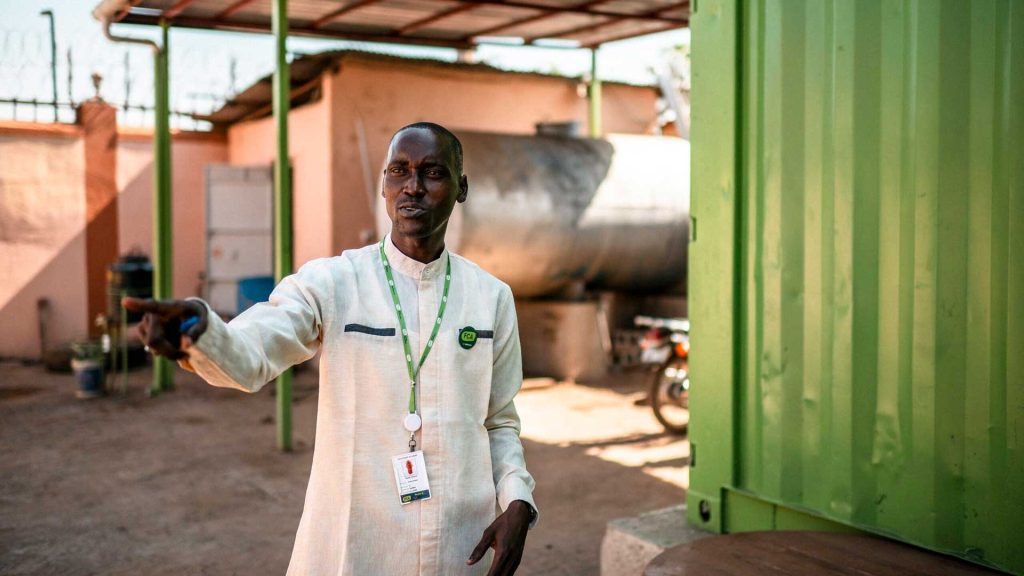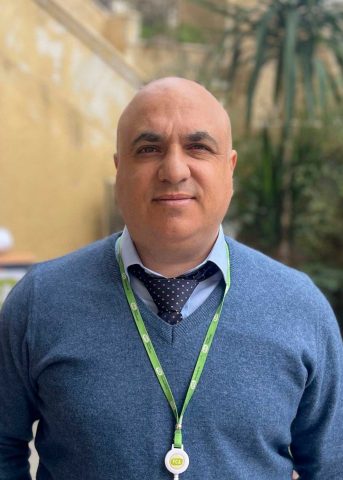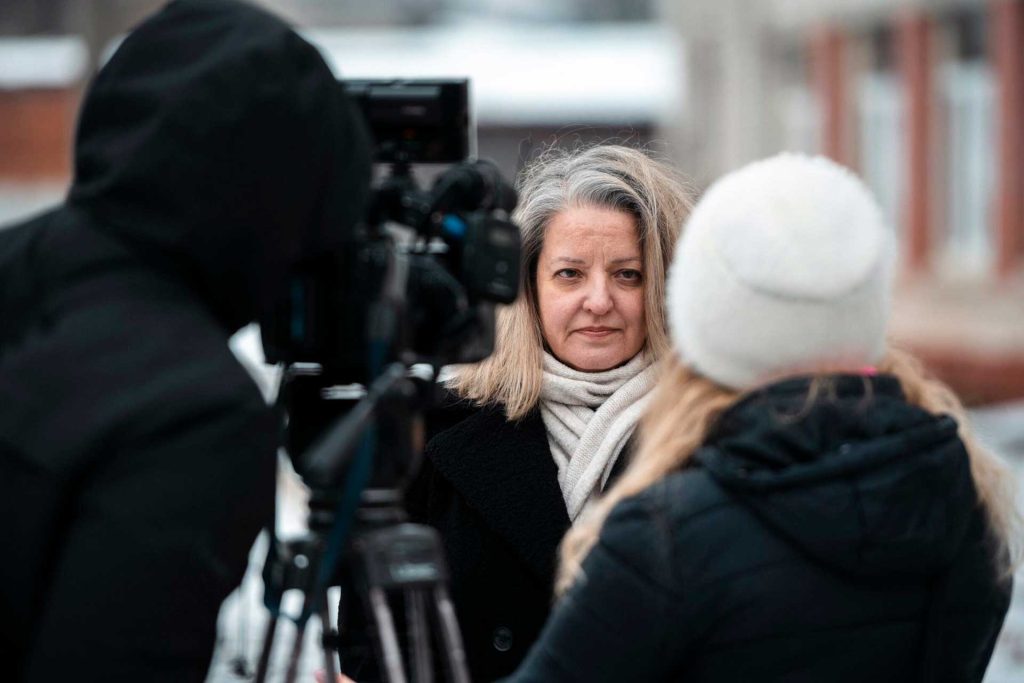Aid workers at the core of crises – where to find the courage to help?
FCA staff in Ukraine, South Sudan and Syria face seemingly insurmountable challenges every day.
Text: Ruth Owen
WORKING IN CRISIS CONDITIONS means frequent threats to your safety and a constant challenge to your mental well-being. In this story, three FCA Country Directors share the unique challenges they face in their work amid conflict and humanitarian crises. They also reveal what inspires and motivates them to continue their work despite the challenges.

“Every time I come to work, I know that what I do has a direct impact on other people”
Seme Nelson studied peace, conflict and development studies at universities on three different continents. However, he decided to return to his native South Sudan, where he now heads the FCA’s Country Office.
“The challenges in South Sudan are manifold. The country is unstable and its economy is fragile. Many live in poverty, exacerbated by conflict, refugees and war in neighbouring Sudan.
South Sudan was basically founded on a background and legacy of violent conflict and internal civil wars. It’s continued to affect the entire stability of the state. We have also faced threats to our security at FCA. Our Pibor office was ransacked by local people in 2016 amongst widespread attacks on NGOs. And in 2022 our Fangak office destroyed fighting between armed groups, but our staff remain, as do I.
In 2020, I considered remaining in Japan, where I did my master’s degree. But I considered whether what I do would make a significant difference to people’s lives or not. When I remain here in South Sudan, every time I come to work, there is a very direct connection between what I do and how it impacts people.
What has continued to push our staff to continue to work despite the difficulties and challenges is the impact that our programme makes on the people. Every time you see these beautiful stories of change. From young people, mothers, kids who are able to go to school. You feel like our work is contributing to transforming societies, improving people’s access to livelihoods and helping citizens demand their rights.
When the Sudanese conflict broke out in 2022, a lot of Sudanese fled to South Sudan along with former South Sudanese refugees who decided to return to their country. At present, I think only five per cent of these refugees from Sudan are living in refugee camps or settlements inside South Sudan. Probably 80 per cent of them are housed by South Sudanese – people who have decided to open their homes to welcome Sudanese refugees to share the little that they have. The media always wants to document stories of suffering, of desperations, but for me I think we should highlight positive stories like these more.
Yes, my country is founded on a story of conflict and desperation – the process of state building has almost started from zero. But if we look at the infrastructural transformation of the country from 2005 when the second civil war ended, there has been a tremendous growth process. The country has a city called Juba that we’re proud of today, that never even existed before! Regardless the situation of desperation in this country, the generosity, strength and courage of people is something worth acknowledging.
“It is important to distinguish between political problems and solidarity with people who are suffering”
Mazen Khzouz’s home is in Jordan, but his work requires him to spend long periods away from his family. As FCA Country Director for Syria, he believes it is important for him to be close to the communities he works with.

“I’m not the kind of person who’s satisfied with only doing the basic in my life. I need to do more. I need to be closer to people who I serve.
Syria is suffering the effects of a long conflict, economic collapse and a devastating earthquake. The country is under severe sanctions, which are contributing to the impoverishment of the population and increasing suffering. Sanctions have led to a lack of access to all basic necessities and a lack of money. Prices have skyrocketed, purchasing power has been eroded and unemployment is very high. An estimated 90% of Syrians now live below the poverty line. The cost of living has more than doubled since 2023, as measured by the Minimum Expenditure Basket.
The security situation in Syria has improved in relative terms compared to the most difficult years of the conflict. Humanitarian actors are now in a better position to reach vulnerable groups. However, the security situation remains volatile and new outbreaks of violence are possible. Sporadic attacks, inter-group clashes and multiple checkpoints between population centres can also slow down progress in the areas where the FCA’s work is taking place. Journeys to schools and communities can take as long as three or four hours.
Social tensions increase during disasters. It gets frustrating when some people get help and others don’t, even though many need it. Tensions are also a risk for our employees. To mitigate them and ensure staff safety, we build strong relationships with community leaders and local actors.
When we understand that people are struggling to meet their basic needs – to feed and clothe their children – it is easy to understand their strong reactions. We at FCA Syria wish we could do more and reach even more of those in need.
All our employees are Syrian. Staff members have lost loved ones in war, earthquake and even cholera. It is common for one of our staff to help at least two or three other relatives or households with their income.
My family back in Jordan are wondering how much I can endure from the situation, but the proximity to the country helps a lot. I explain to my family we have a strong evacuation plan and I give them assurance that we are safe.
The media constructs a certain image of Syria, which influences the perceptions and opinions about the people and that’s a very big mistake. We need to differentiate between people who are suffering and whatever problems there may be in the political domain.
The Syrian people do not deserve to be mistreated. They are human beings. They have children. They deserve to live a decent life as much as you and I do.”

“I miss my family, but I want to see Ukraine prosper and be free”
Patricia Maruschak is the granddaughter of Ukrainian immigrants to Canada and grew up in the Ukrainian diaspora. She lived and worked in Ukraine from 2006 to 2010, before returning in 2022 to head up the FCA Ukraine office.
Ukraine has been at full since its neighbour Russia invaded in 2022. Frequent air alarms across the country, when there is a threat of attack, lead to constant disruptions to daily life. This impacts greatly on children’s education and their psychological wellbeing, as well of that of their teachers.
Recently in Chernihiv, one of the schools where we have done repairs was damaged because there was a bombing very close to the school. The alarm went off, everyone went downstairs, and were standing for the daily moment of silence for the fallen. During that moment there were three huge explosions close by. Everyone had to immediately lie on the ground, the children were very scared. It’s the teachers’ job to keep them calm in a situation that’s uncertain for everyone. In the meantime, people from the street were also trying to get into the shelter.
All over the country, when an air alarm goes off, everyone has to go into the shelter. Teachers have to try and continue with learning where sometimes there’s no separation for classes. Imagine trying to continue a lesson with 7 or 8 year olds when there are now another 100 children in the room!
We train teachers in ‘psychological first aid’ to help children in the moment. Then we also train them in ongoing mental health support for kids, who have had trauma experiences, or have family members who are away fighting or have returned severely injured and have their own traumas. And then we also help teachers take care of themselves with coping strategies.
Many of our staff never worked in NGOs previously, coming mainly from the business community, but now they’re proud to be helping fellow Ukrainains.
Our procurement officer was an IDP (Internally Displaced Person) at the beginning of the war, because her community was occupied by Russian troops for a while. Meanwhile, our head psychologist has been displaced twice, firstly from Donetsk due to Russian occupation in 2014 and then from the south-east of the country when the fullscale war began in 2021. It’s not just a job for our people, it’s also their life.
I miss my family a lot. But there are clear needs here and the ability to make an impact in Ukraine is very high. We work with capable and experienced Ukrainian education experts. It’s a pleasure and a good challenge to work alongside them and personally, I want to see Ukraine succeed and be free and capable of making its own choices.”
Seme, Mazen and Patricia will speak at the World Village Festival in Helsinki on 25 May 2024.